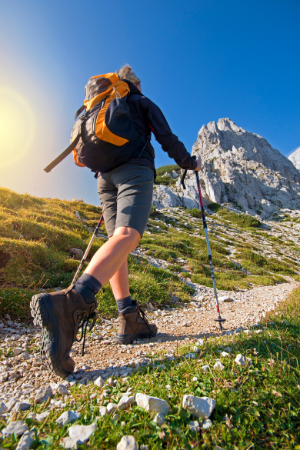Why is it so hard to get back on the wagon once you fall off? For some people, whatever wagon you just fell off, be it diet, exercise, alcohol, etc., the amount of time and effort it can take to recover from that slip can sometimes seem overwhelming. While mulling this over, I came across a trail in the Alps that is a perfect metaphor for what I’m referring to here.
The Hardergrat Trail is a trail that traverses the peaks of the Alps and runs 24 kilometers from Interlaken to Brienzer Rothorn Station in Switzerland. When I first saw the Hardergrat Trail, I realized that visually, it’s a perfect metaphor for what happens to me, and I’m sure lots of other folks out there, regarding how difficult getting back in the saddle can be when we fall off.
When you look at a picture of the trail, you realize that a misstep would not just take you off-trail but likely cause you to fall a great distance. Or at least roll downhill for quite a while. You can then start to understand that for some of us, every time we fall off, there is the same excessive amount of energy necessary to get back on.
For some others, falling off the wagon is equivalent to stepping off a sidewalk onto a comfortable grassy field. The amount of energy required to get back onto the sidewalk is negligible. As such, they have no issues with occasional dalliances with whatever exists when they leave the path.

For those walking along the Hardergrat, the need to stay on course is critical because the amount of energy required to get back to the trail if we step off can be immense and sometimes overwhelming. The energy needed to stay on the trail is negligible, and it’s not worth it to choose to step off for whatever perceived benefit we think we’re getting by deviating from the path. That benefit could be the food you’re craving that you know you shouldn’t be eating. It could be taking a rest day from exercise after having already taken several of them in a row. It could be going out with friends or family for dinner and drinks, again. It doesn’t matter in the end what it is.
Suppose you’re the type of person who, like me, is walking along their own personal Hardergrat. In that case, you must weigh not only what those actions might mean for negating or delaying the achievement of your health-related goals but, more importantly, the amount of energy it may take you to recover once you’ve left the trail.
If this resonates with you, I’d appreciate your thoughts and any feedback you might have on this idea.
